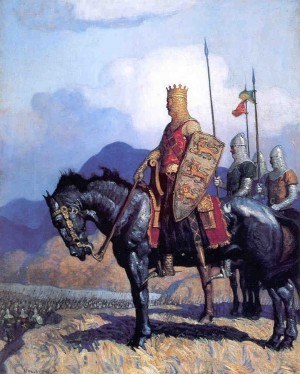“[Religion] is the opium of the people” – Karl Marx boldly declared this, as he set about creating what he perceived to be a new and better utopia. Even though Communism as an idea is nowadays morally spent, it is easy to see that its equally dangerous cousin, Socialism, lives on and has never been better.
The two share the ugly trait of militant atheism – not only aggressively discarding religion as the sum of all evils but also attempting to stamp it out in a blind rage. If a modern SJW is probed as to why his hatred of religion is so unwavering, he will more than likely fail to provide a reasonable explanation, preferring instead to hurl tired old Marxist buzzwords such as “Christian oppression.”
This is to be expected. What worries me, however, is that good, intelligent men are often infected with the same virus, failing to comprehend its Marxist roots. They claim that Christianity is a religion of the weak, that it caters to people who want to lead a sheltered life, that it stifles free thought.
After the evisceration of much of organized Christianity at the hands of Marxists and their allies since the 1960s, it is easy to fall for the trap of identifying with such leftist claptrap and claim that the proof is in the proverbial pudding. In the following piece I wish to present the argument to the contrary – Christianity is a red pill religion if its precepts are abided by.
Christianity condemns laziness and encourages self improvement
St. Paul puts the matter simply: “if any would not work, neither should he eat” (2 Thessalonians 3:10.) On many levels this seems perfectly natural, but it is a truth which has unfortunately been lost on many people today. We see this affliction especially in the modern teenager (the author of this article was very much guilty himself). They laze around, looking at their phones or tablets, flicking through endless channels of mind numbing crap. There is no spark in their eyes, as if their soul was sick.
This is exactly how sloth (laziness) was viewed in early Christianity, as a sickness of the soul. Christian scholars differentiated between different types of sloth but were certain on one aspect: it is hugely damaging to the overall human being. We only get one chance at this life and it is a crime to waste it on doing nothing. Sloth breeds more sloth.
On the other hand, Christians are called to develop their strengths and create through their God-given talents. The Parable of the Minas (25 Matthew 14-30) is clear on this issue. The servants who took risks and used the money their master gave them were duly rewarded and praised. The servant who buried his talent was condemned.
However, by their fruits ye shall know them. With an emphasis on viciously stamping out sloth and contributing one’s very best efforts, is it a wonder that Christianity spread like wildfire and was the cornerstone of the great Western civilization?
Christianity promotes learning

The Bible tells us to seek the truth because the truth “shall make you free” (John 8:13). Despite the left wing media’s incessant drumming of the terrible Inquisition suppressing any form of free thought or the suffocating effects of Puritanism on the Protestant world, I wish to present a different picture. For centuries, Christian scholars were at the forefront of science and learning, vigorous in their task of inspecting God’s handiwork.
Few remember that it was the Catholic Church of the Middle Ages which created the foundations of a higher education system, setting in motion the events which would vindicate the West as an undisputed world hegemon. It was under the patronage of the Church in medieval universities such as the one in Bologna, Italy that ideas were exchanged, priceless manuscripts compiled and civilization so laboriously built. Later, the Jesuit colleges across the world educated the brightest minds for many centuries with a curriculum famous for its breadth and academic vigor.
Even fewer remember that much of the knowledge we posses today actually comes through the efforts of Christian clergymen. In his book How the Catholic Church Built Western Civilization, Thomas E Woods mentions examples such as Nicolas Steno, a Catholic priest thought by many as the Father of Geology, Fr Athanasius Kircher famous for his work in the area of Egyptology and Fr Giambattista Riccoli, a renowned astronomer and physician. With the mantra of “seeks and ye shall find,” Christianity has facilitated learning and education on a previously unprecedented scale.
Christianity promotes strength and sacrifice

What leaders used to be like.
Let’s cut straight to the chase on this one. This aspect of Christianity is best illustrated when the ethos of pre – “enlightenment” Europe is considered, before everyone started receiving illusory “rights of man” from their government with no responsibilities added.
Take the Crusades. “But these evil Europeans went over to the Middle East to rape, pillage and conquer peace loving people of different faiths” – immediately exclaims the chump who has been drinking the PC cool aid all his life. Not quite. True, the Crusades did have their negative aspects (such as the unwarranted detour to Byzantium during the Fourth Crusade) but I am referring to the overall picture.
Thousands of men, rich and poor, dropped everything to fight and die for an idea – to regain the Holy Sepulcher for Christendom and help their eastern brothers who were being crushed under what seemed like an invincible tide of Islam.
Many nobles sold everything they had to buy weapons, armor, and supplies for the journey. Thousands of peasants left their villages and families to follow them. Most knew they would never come back to their homeland, yet still chose to go.
Look at the mentality of the leaders who took part. Fredrick Barbarossa of Germany was one of the most powerful people in Europe at the time. He did not have to go anywhere, he had it all. Barbarossa died as many did on the perilous journey, drowning in an attempt to cross a river on the way to the Holy Land.
Richard the Lionheart, King of England, spent three years under the walls of Acre waiting to starve the defending Saracens into submission. Three years! He was reported to personally lead assaults on the walls, scaling the siege ladders with his men under a hail of arrows. I realize that we live in different times, but leaders of such fortitude and courage are sorely missed today.
These men embodied the very ethos of Christianity. Their attitude was uncompromising – they did not try to make excuses but gave their best efforts to whatever was required of them, not afraid to pay the ultimate price.
Christianity de-pedestalizes women and encourages positive gender relations

Most people notice that something is amiss in modern gender relations. Women are often valued over and above men and unduly pedestalized. At the same time, male traits such as aggressiveness, competition, and dominance are encouraged over traditional feminine traits such as gentleness and humility in same women. Go figure. The results of this erratic social engineering have already been discussed ad nauseam.
The Christian Bible has a few interesting things to say about gender relations, going back to the Garden of Eden. Eve was created as a “helpmate” for Adam, not some kind of “soulmate” or “better half.” Their union was then blessed by God, creating the first marriage.
It is clear that the Bible did not envisage women to rule over their men. One of the Biblical punishments of an unruly and unfaithful people in the Old Testament was allowing the women and children to do just that:
As for my people, children are their oppressors, and women rule over them. O my people, they which lead thee cause thee to err, and destroy the way of thy paths.” (Isaiah 3:12)
I am sure this is not a popular verse amongst the politically correct. However the same motif is repeated later on by St Paul, who tells the early Christians: “But I suffer not a woman to teach, nor to use authority over the man: but to be in silence.” (1 Timothy 2:12) Therefore, it is the man’s job to be the leader, both in the Church and in the household.
At the same time this should by no means be interpreted as a license to be a tyrant. Women are not expected to be men’s slaves, walk whatever amount of paces behind men, or generally be bullied. In fact, men are called to love their wives as Christ loves the Church. This is a sacrificing love, which is pure, unwavering, and understanding. Women are not there to be used and abused.
If what is described above is not a model for healthy gender relations, than I really don’t know what is.
Conclusion
It is impossible not to notice that Christianity is under ferocious attack in the Western world. Its rites are mocked. Its precepts are attacked as oppressive. Its heritage is presented as an everlasting shame to mankind.
Let me remind you that this was also the case in the Soviet Union and anywhere else Communism reared its ugly head. As cultural Marxism is slowly but surely building its layer in the Occident, its communistic roots are at once discernible through the preponderance of militant atheism. It is important to know one’s enemy so that he is not able to deceive.
Perhaps it is worth stopping for a moment and asking the simple, but tremendously important question: why is Christianity viewed with such hostility by our increasingly socialist governments and media? Does it hold a valid message which could inspire and uplift the men of today? Is it a threat to the ruling kleptocracy? Does it present an alternative to the mentality of servility our overlords are so keen for us to adopt?
Read More: How I Tried To Turn A Ho Into A Housewife
